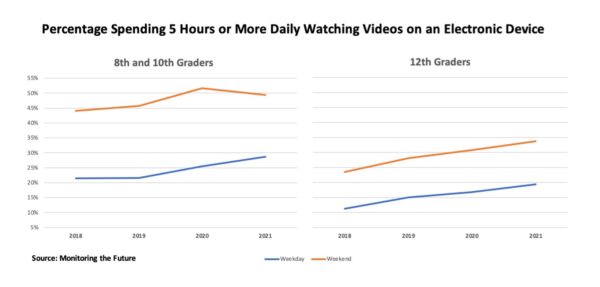Parents in America know the difficulties of pulling their children away from electronic devices, especially after months of virtual learning due to school lockdowns during the pandemic.
About half of America’s middle schoolers spend five hours or more daily on weekends watching videos on an electronic device, and 30 percent spend seven hours or more daily on weekends, according to the 2021 data collected by Monitoring the Future (MtF), a project affiliated with the National Institute of Health.

Many parents have been limiting the number of hours their children have access to devices. Still, the algorithm on those video platforms—the key component contributing to addiction and other child development issues—is beyond reach.
To keep the viewers’ attention, the algorithm keeps feeding them related content that could form addiction loops, in which viewers would keep responding by generating dopamine, something that gives people jolts of joy.
“We call it a wormhole. You think five minutes have passed. You look up; it’s been an hour,” Nick Janicki, a tech entrepreneur and director of media relations of Gan Jing World, a new tech platform, said in a recent interview with Epoch Times’ “California Insider” program, adding, “The physics analogy of a wormhole is something that sucks you in like a black hole.”

And there’s more to these addiction loops. Being fed similar content over and over again could cause one to become close-minded, he said. “It comes back to the confirmation bias. Once you already have a bias, the algorithms are going to continue to hone in on that bias. So, it’s not broadening your horizon.”
Unlike adults, children are more likely to be influenced by the algorithms inducing constant dopamine loops. In Janicki’s view, the bias confirmation algorithm could lead to something scary very quickly, especially for children.
“If I’m looking at cat videos all day, now all my friends on social media are cat video people. And we have this confirmation bias that the best videos in the world are cat videos,” he said, giving an example. “So imagine that with negative content, and you start feeding into these kinds of micro-groups, and it gets very, very scary very quickly. Because we’re using the very base of human biology. And again, it comes back to children.”

What can parents do to protect their children from harmful algorithms, then?
Janicki said there are three ways to react to new technology: “You can ignore it, you can try to stop it or destroy it, or you can try to put good back into it.”
To him, the last approach is what Gan Jing provides to its customers.

Gan Jing means “clean” in Chinese. He explained the fundamental content rules of Gan Jing: “no violence, no criminal activity, nothing harmful, and nothing erotic.” Other than those, he said Gan Jing is open to conversations all over the opinion spectrum.
“What we saw from a tech standpoint is we started with the algorithms. We started with advancing technology, and the morality had to catch up,” he said, adding that the free market allows engineers to “actually open up a video and blogging platform that can be open to all sides, that’s family-friendly and starts with the morality.”
“So I think this is really, really important to know: hey, there’s a safe place on the internet that’s fully G [rated]. You’re not going to get accidentally taken into a negative addiction wormhole, no matter where you go,” he added. “The worst-case scenario is: you get too many educational videos, so you can be addicted to upgrading your character. There can be worse things, right?”
Now Gan Jing World offers monetization opportunities for creators as well. That started last month.








